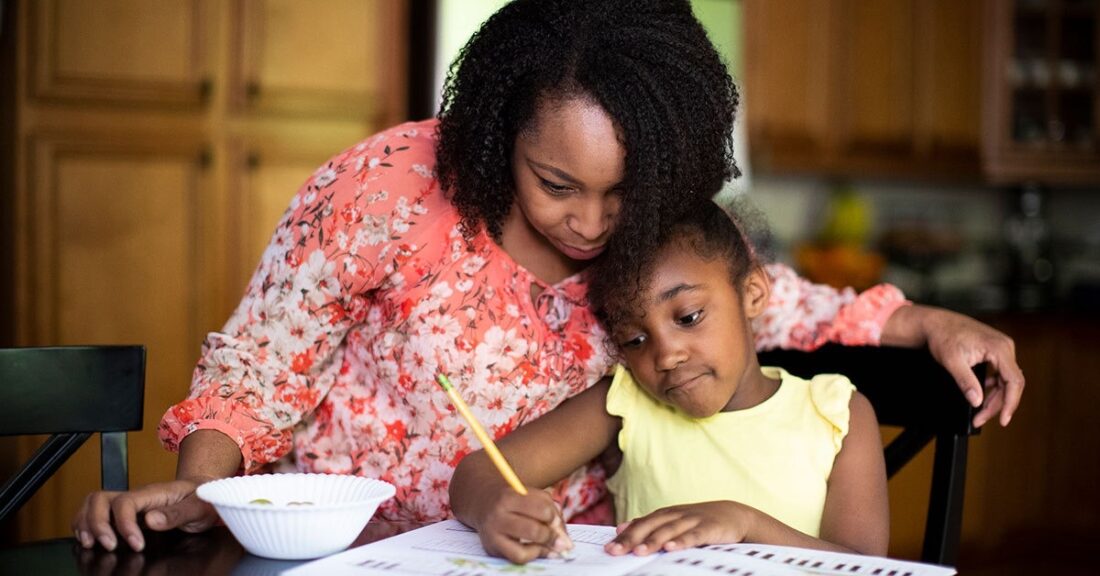Strengthening Services With Two-Generation Approaches in Memphis

The Annie E. Casey Foundation has sponsored an equity-focused project for quickly designing and testing improvements in initiatives that serve children and their parents together ― known as a two-generation approach (2G).
Introducing REVISE 2G
COVID-19 has disproportionately affected communities of color and shifted service delivery from face-to-face to virtual venues. This change has magnified the need for innovative, high-quality family support in areas such as health, education and employment.
Enter Refining Virtual Services to Engage 2G Families — also known as REVISE 2G — a project that launched in October 2020 and sought to solve this new challenge.
REVISE 2G looked at two initiatives offered by Agape Child & Family Services — a faith-based organization in Memphis, Tennessee — that serve a predominantly (95%) Black population. The first is a school-based mentoring program, called Stars, that aims to improve student attendance and behavior. The second is a coaching program, called TeamWorks, that helps to connect adults with the right resources so that they can achieve their education and employment goals.
Agape staff employed a strategy called rapid-cycle learning, which enables them to test solutions to service challenges at a small scale. As a result, the staff can gain a better understanding of what is — and isn’t — working and enact the necessary adjustments before expanding their programming.
The framework Agape staff employed to drive their rapid-cycle learning spans three phases:
- Learn, which builds an understanding of the program environment and a common definition of the service delivery challenge;
- Innovate, which involves creating solutions together that reflect people’s needs and are informed by evidence); and
- Improve, which requires continuously refining solutions to understand what works, for whom and under what circumstances.
As the staff advanced this framework, known as LI2, they connected directly with the kids and parents involved. These families, as well participating school districts and employers, helped pinpoint areas of opportunity while staff focused on developing, testing and refining solutions.
According to Mathematica, which contributed their expertise on rapid-cycle learning throughout the project, Agape staff “believed the strategies we co-developed and tested with Stars and TeamWorks strengthened family engagement, supported outcome effectiveness and enhanced goal-setting and monitoring processes.”
Lessons and Next Steps
REVISE 2G revealed important lessons for Agape, its partners and any organization interested in advancing two-generation solutions. These lessons include:
- Families and representatives of community organizations can be vital forces in equity-focused research. These groups contributed valuable insights and played an active role in making and shaping decisions throughout the project.
- The success of rapid-cycle learning hinges on collaboration at all levels. Frontline staff can provide insights on service delivery and family experiences while leaders can manage coordination and align service testing with their organizational and strategic priorities.
While the pandemic inspired REVISE 2G, the project also exposed some longstanding organizational challenges. One example: Frontline staff reported having a harder time serving families when the work required them to move beyond their areas of expertise.
Moving forward, the three partners — Casey, Agape and Mathematica — plan to continue sharing lessons about rapid-cycle learning.
Allison Holmes, a senior research associate in Casey’s Research, Evaluation, Evidence and Data unit, is quick to sing the strategy’s praises. She describes the REVISE 2G project as “an inclusive way to support two-generation programs” and one that elevates “members, community partners and the people served by them to be decision makers and experts.”
Read Mathematica’s Report on Using Rapid-Cycle Learning to Drive Equitable Change






